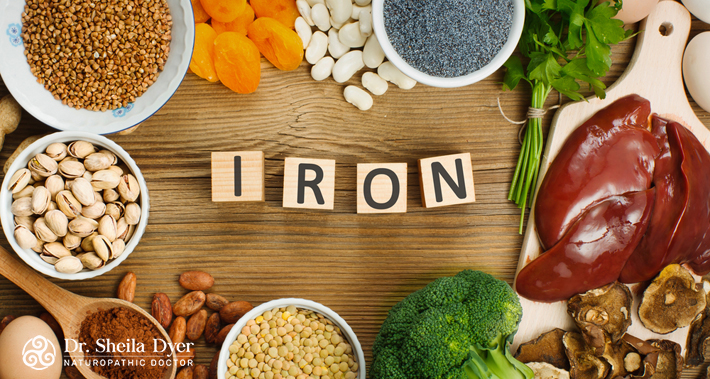Dealing with issues related to the stomach and intestines is never fun.
For many of us, it just might mean avoiding certain foods, or knowing what will trigger a bad reaction.
But for individuals with inflammatory bowel disease, such as ulcerative colitis, flare ups can be painful and debilitating.
As a gut health naturopath for digestive problems I want to help you better understand your gut health and provide strategies for preventing painful flare ups.
Keep reading to learn more about ulcerative colitis, and natural ways to manage it.
What Is Ulcerative Colitis?
Ulcerative colitis is a form of inflammatory bowel disease, along with Crohn’s disease.
Cells lining the surface of the bowels die due to inflammation, and as a result of this cell death, ulcers begin to form.
Ulcers can cause discharge of mucus, and bleeding.
Because of this inflammation, the bowels empty more often than they would otherwise.
Other examples of health concerns linked with inflammation include:
- Rheumatoid arthritis
- Certain types of heart disease
- Eczema
- Menopause
- GERD (acid reflux)
- Hyperthyroidism
- And many others
Different Types Of Ulcerative Colitis
The types of ulcerative colitis are based on which area of the gastrointestinal tract they occur in.
Extensive colitis, or pancolitis, results in inflammation which occurs through the whole colon; this is the most severe form of ulcerative colitis.
Left sided colitis is when there is inflammation between the upper part of the colon, where it bends, and the distal colon.
Ulcerative proctitis is a mild form of ulcerative colitis where only the rectum is inflamed.
Ulcerative Colitis Symptoms
If you have ulcerative colitis, you may not even show symptoms.
In fact, you can go through long periods of time without any symptoms, and then experience flare ups.
When symptoms of ulcerative colitis do occur, they can include those directly related to the gut, as well as symptoms which affect other parts of the body.
Gut related symptoms can include:
- Malnutrition
- Abdominal pain
- Diarrhea
- Fever
- Unexpected weight loss
- Blood in the stool
- Rectal pain
Symptoms related to other areas of the body include:
- Inflammation of the eye
- Pain and swelling in the joints
- Skin conditions
- Sores in the mouth
- Low appetite
- Nausea
What Causes Ulcerative Colitis?
Ulcerative colitis is believed by researchers to be an autoimmune condition – this is a condition where your body’s immune system mistakes your own tissues for pathogens and attacks them.
However, the exact reason why some people’s immune systems attack the large intestines while others don’t is unknown at this point.
Other factors which could play a role in whether someone develops ulcerative colitis include:
- Environmental factors, such as pathogens which could trigger immune system reactions
- Genetics and family history
- Existence of other immune disorders
How A Naturopathic Doctor Can Treat Ulcerative Colitis
If you suffer from ulcerative colitis, there are a number of naturopathic solutions for autoimmune conditions like this which can help.
Let’s have a look at some of these.
1. Acupuncture
Acupuncture is a form of traditional Chinese medicine which is becoming more widely used in the west as a way to provide treatment for inflammatory bowel disease, including ulcerative colitis.
One study, in the Scandinavian Journal of Gastroenterology found the use of acupuncture to be of therapeutic benefit for patients with ulcerative colitis.
Acupuncture treatment in Toronto can be used for a wide range of different conditions beyond ulcerative colitis as well, including:
- Acupuncture for carpal tunnel syndrome pain
- Acupuncture for chronic fatigue
- Acupuncture treatment for fibromyalgia
- And much more
2. Take Probiotics
Although the word “bacteria” has negative connotations for many people, there is actually such as thing as “good bacteria”.
These good bacteria live in your gut and help your body to better be able to fight infection and absorb vitamins and other nutrients.
Additionally, the enzymes they produce fight off the bad bacteria which can lead to infection and inflammation.
Some foods rich in probiotics include:
- Kimchi
- Tempeh
- Probiotic yogurt
- Natto
- Miso
- Kombucha
- Kefir
- Sauerkraut
Related: What Are Probiotics And Why Are They So Good For You?
3. Eat More Iron Rich Foods
Ulcerative colitis can sometimes result in anemia, a condition in which your body doesn’t have enough red blood cells to carry oxygen to your body’s tissues.
This is due to bleeding from ulcers and blood in the stool.
Iron also supports metabolism, energy levels, and overall well being.
As a result, if you have ulcerative colitis, you may also need to seek naturopathic solutions for anemia.
If you don’t think you’re getting enough iron, try adding these to your diet:
- Spinach
- Black beans
- Beef
- Liver
- Egg yolks
- Cereals, pasta, and bread which have been fortified
- Seafood
- Red meat
4. Eat Turmeric
It’s a tasty way to spice up your foods, but there are many health benefits of turmeric as well.
Its active ingredient, curcumin, is known for its powerful anti inflammatory properties.
In some cases, patients with inflammatory bowel disease were able to stop taking prescription medications because of the improvements to their condition they experienced using curcumin.
Try sipping on a tasty turmeric tea to get the benefits of this powerful antioxidant, but be sure to talk to your medical doctor or Toronto naturopathic doctor before going off any medications completely.
5. Stay Hydrated
A common complication for people with ulcerative colitis is dehydration.
This is because inflammation of your intestine can prevent your body from absorbing enough fluids, and lead to excess water in your bowel movements.
Be sure to drink plenty of fluids.
You’ll want to avoid coffee and alcohol as well, but clear broths, low fibre fruits, and decaffeinated teas are great options to help increase your fluid intake.
To know if you’re properly hydrated, keep an eye on your urine – if it’s a light yellow colour you’re on the right track, but if it gets to be too dark, that’s a sign of dehydration and a cue to drink more water.
6. Eat More Omega 3 Fatty Acids
Omega 3 fatty acids are healthy fats that have anti inflammatory properties.
They block chemicals called leukotrienes which can cause inflammation.
In a 2010 case study a thirty eight year old women with ulcerative colitis went into remission after adding omega 3 fatty acids to her diet.
Naturally, more research needs to be done before we can say conclusively that omega 3 fats can help.
But because they have so many other benefits and are well tolerated, it’s never a bad idea to include more of them in your diet.
Book Your Appointment With Dr. Sheila Dyer, ND, Today
Do you suffer from inflammatory bowel disease, such as Crohn’s or ulcerative colitis?
Do you want to be able to manage your symptoms naturally?
I’m Dr. Sheila Dyer, ND, a Toronto based naturopath, and I can help.
Contact my office today to find out more about how naturopathic medicine can help you, and to set up a consultation.
If you have questions about naturopathic medicine, or would like to start with your first consultation, contact me, and let’s book an appointment.
Dr. Sheila Dyer, ND1080 Dovercourt Rd,
Toronto, ON M6H 2X8
(416) 554-5135
► https://g.page/DrSheilaDyerNd
Dr. Sheila Dyer is a Naturopathic Doctor and a practicing registered nurse offering holistic healthcare with a scientific focus

